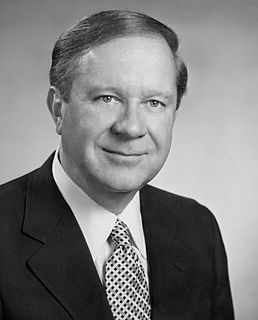Ein Zitat von Bruce Babbitt
Ich denke, dass die Steuerreformvorschläge von Ronald Reagan ein Schritt in Richtung Verteilungsgerechtigkeit sind. Sie verteilen die Steuerlast gerechter und progressiver auf die Privatpersonen und verlangen von den Unternehmen, dass sie einen etwas größeren Anteil der gesamten Steuerlast tragen. Beides sind Schritte in Richtung Gerechtigkeit und Verteilungsgerechtigkeit.
Verwandte Zitate
In Bezug auf Wirtschaft und Steuern: Amerikas erfolgreichste Leistungsträger zahlen tatsächlich einen höheren Anteil der gesamten Steuerlast. Das obere Prozent der Einkommensbezieher zahlte 1981 18 Prozent der gesamten Steuerlast und zahlte 1991 25 Prozent. Die unteren 50 Prozent der Einkommensbezieher zahlten nur 8 Prozent der gesamten Steuerlast und zahlten 1991 nur 5 Prozent. Geschichte zeigt, dass Steuersenkungen immer zu einem verbesserten Wirtschaftswachstum und damit zu höheren Steuereinnahmen in der Staatskasse geführt haben.
Eine Steuerreform für das 21. Jahrhundert bedeutet, fleißige Familien zu belohnen, indem unfaire Schlupflöcher geschlossen, die Steuersätze auf breiter Front gesenkt und die Steuergesetzgebung drastisch vereinfacht werden. Es fordert eine Reduzierung der Steuerlast für amerikanische Unternehmen jeder Größe, damit sie einen größeren Teil ihres Einkommens für Investitionen in unseren Gemeinden behalten können.
Wenn Sie das Gesetz ändern müssen, um mehr Geld zu bekommen, ist das eine Steuererhöhung, und Americans for Tax Reform unterstützt alle Bemühungen zur Steuerreform, um Abzüge oder Gutschriften oder etwas, das falsch klassifiziert wurde, abzuschaffen, solange Sie gleichzeitig die Steuer senken Steuersätze, damit es sich nicht um eine versteckte Steuer handelt.
Nun, ich denke, die Realität sieht so aus, wie Sie sehen: Als Präsident Kennedy die Grenzsteuersätze senkte, als Ronald Reagan die Grenzsteuersätze senkte, als Präsident Bush diese Steuersenkungen durchführte, erzeugten sie tatsächlich Wirtschaftswachstum. Sie haben die Wirtschaft ausgeweitet. Sie erhöhen die Steuereinnahmen.
Ich denke tatsächlich, dass die Grenzsteuer – das Konzept der Grenzsteuer ist eher eine Handelsfrage als eine –, wenn wir also über eingehende Einkünfte sprechen, glaube ich, dass die Grenzsteuer in ihrer Form ist, wenn wir sie verwenden, ist die gegenseitige Steuer eine Steuer das liebe ich wirklich, weil im Grunde niemand dagegen ankämpfen kann.
Die Umsatzsteuer ist die beste und gerechteste Steuer. Die Benzinsteuer, die nichts anderes als eine Umsatzsteuer ist, hat sich als schmerzlos, produktiv und strafend erwiesen. Auf alles, was wir kaufen, sollte der gleiche Steueranteil erhoben werden, mit Ausnahme von billigen Lebensmitteln und billiger Kleidung.
Mir gefällt die Idee der Verbrauchssteuer sehr gut, und in den meisten Ländern gibt es eine ziemlich hohe Verbrauchssteuer. Man nennt sie Mehrwertsteuer oder Waren- und Dienstleistungssteuer ... Es ist eine Umsatzsteuer. Es besteuert nicht die Arbeit, es besteuert weder Ersparnisse noch Investitionen – es besteuert den Konsum.
Die Abgabenordnung ist sehr ineffizient. Sowohl das persönliche Steuergesetzbuch als auch das Körperschaftsteuergesetzbuch. Durch das Schließen von Schlupflöchern und die Senkung der Steuersätze könnten Sie die Effizienz des Steuerrechts steigern und mehr Investitionsanreize für die Menschen schaffen.
































